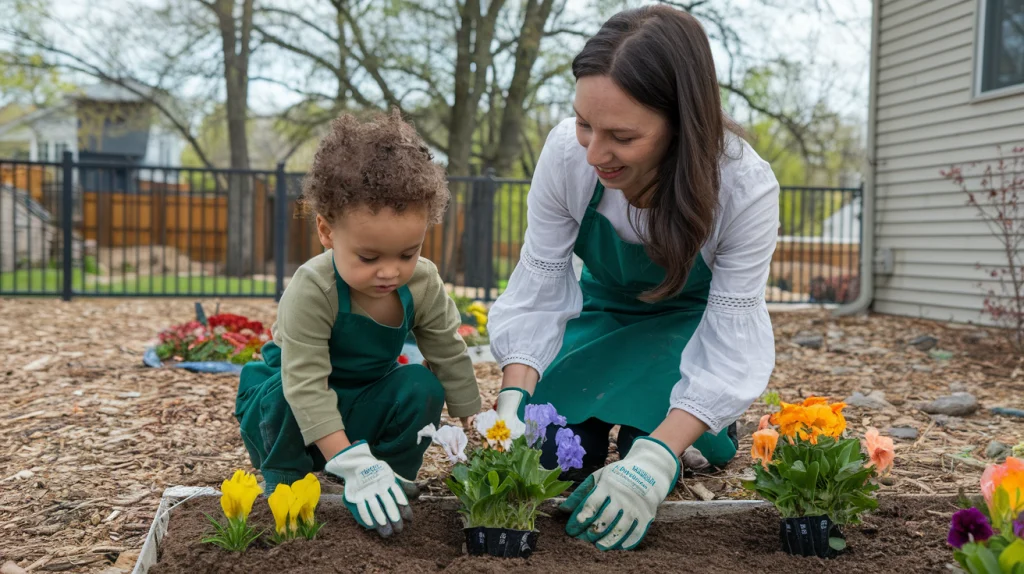Mother’s Day can stir up complex emotions for divorced families, especially for mothers navigating this special day within new co-parenting dynamics. For Northern Virginia families adjusting to life after divorce, this holiday presents both challenges and opportunities to create meaningful celebrations that honor motherhood while respecting new family structures.
The Emotional Landscape of Mother’s Day After Divorce
The first Mother’s Day following a divorce often comes with a mix of emotions that many women aren’t prepared to navigate. What was once a day of family celebration may now feel different, sometimes lonely, and occasionally stressful. Many divorced mothers in Northern Virginia and beyond report feeling a sense of loss when traditions change or when children spend part of the day with their other parent. These feelings are completely normal and acknowledging them is an important step toward creating new, positive experiences.
Children also experience emotional complexity during post-divorce holidays. They may feel torn between parents, unsure of how to celebrate, or worried about hurting one parent’s feelings while honoring another. Understanding these dynamics can help mothers prepare emotionally and support their children through this transition. Family therapists serving Fairfax County and surrounding areas often emphasize that children benefit when both parents approach holidays with flexibility and child-focused intentions.
Self-compassion becomes particularly important during these emotional transitions. Northern Virginia’s many support resources, including groups specifically for divorced parents in Arlington and Loudoun counties, can provide valuable community during challenging times. Remember that adjusting to new patterns takes time, and each year typically becomes easier as new traditions take root.
Legal Considerations for Holiday Parenting Time in Northern Virginia
In Northern Virginia, parenting plans and custody agreements often include specific provisions for holidays, including Mother’s Day. Understanding the legal framework surrounding your co-parenting arrangement is essential for smooth holiday planning. Virginia courts generally recognize (and parties often understand) the importance of children spending Mother’s Day with their mothers and Father’s Day with their fathers, even if these days fall during the other parent’s regularly scheduled time.
If your divorce is recent and you don’t have clear provisions for Mother’s Day in your parenting plan, consider working with a family mediator to establish mutually agreeable terms. At Kales & Kales, PLC, we are able and willing to assist you with developing a workable holiday parenting plan. Our collaborative approach often yields more satisfactory results than returning to court for modifications.
For those with existing agreements, review the Mother’s Day provisions well in advance. Typical arrangements might include having children spend the full day with their mother, sharing the day between households, or alternating years for extended celebrations. If temporary modifications would benefit your children, initiating those conversations with your co-parent early can prevent last-minute conflicts and stress for everyone involved.
Communication Strategies with Your Co-Parent
Effective communication with your co-parent lays the groundwork for a peaceful Mother’s Day celebration. Approaching these conversations with clarity, respect, and a focus on the children’s experience can transform potential conflicts into collaborative planning. Northern Virginia co-parenting experts recommend initiating Mother’s Day discussions at least a month in advance, allowing ample time to address any scheduling challenges or differing expectations.
Digital co-parenting tools have become increasingly popular among divorced families in tech-savvy Northern Virginia. Apps like OurFamilyWizard and Talking Parents provide neutral platforms to discuss holiday arrangements while maintaining clear records of agreements. These tools can be particularly helpful when direct communication remains challenging, as they focus conversations on logistics rather than emotional topics that might trigger conflict.
When communicating about Mother’s Day plans, be specific about timeframes, transportation, and any special activities you’re hoping to include. For example, instead of saying “I’d like to have the kids for Mother’s Day,” try “I’m hoping we could arrange for the children to be with me from 9 AM to 7 PM on Mother’s Day, and I’d be happy to handle all transportation.” This level of detail reduces misunderstandings and demonstrates thoughtful planning centered on creating a smooth experience for your children.
Sample Communication Template
Many family mediators in Northern Virginia recommend using a simple template for holiday planning communications:
- Start with appreciation (“Thank you for discussing Mother’s Day plans”)
- Provide specific date, time, and logistics requests
- Explain briefly why this arrangement would benefit the children
- Offer flexibility where possible (“If morning doesn’t work, I’m also open to afternoon”)
- End with a clear question or request for response by a specific date
Creating New Mother’s Day Traditions
Establishing new traditions can be one of the most healing aspects of navigating Mother’s Day after divorce. Northern Virginia offers countless opportunities for creating meaningful celebrations that fit your new family structure. The extensive parks system throughout Fairfax and Arlington counties provides beautiful settings for outdoor celebrations, from the waterfront paths at Occoquan Regional Park to the historic landscapes of Meadowlark Botanical Gardens in Vienna.
Consider what aspects of motherhood you most want to celebrate and build traditions around those values. If quality time has always been your love language, perhaps a mother-child hike on the Washington & Old Dominion Trail becomes your new tradition. If acts of service matter most, maybe your children help plant your garden each Mother’s Day. The key is creating experiences that feel authentic and meaningful within your current circumstances, rather than attempting to recreate pre-divorce celebrations.
Many divorced mothers in Northern Virginia have found that involving children in the planning process helps them take ownership of new traditions. Even young children can contribute ideas about how they’d like to celebrate their mother. This collaborative approach not only results in activities everyone enjoys but also teaches children that families can evolve while still maintaining loving connections. As one Loudoun County family therapist notes, “The gift of divorce can be showing children that celebrations are about the people, not the perfect picture.”
Supporting Children Through Split Holiday Celebrations
When children will be dividing their Mother’s Day between households or celebrating with stepmothers as well, thoughtful preparation helps them navigate these transitions with confidence. Children often experience guilt or anxiety about split celebrations, worried they might hurt a parent’s feelings by enjoying time with another parental figure. Creating an atmosphere of permission and encouragement alleviates this burden significantly. Explicitly tell your children that it’s okay to enjoy celebrating with their other parent or stepparent, and that their happiness is what matters most to you.
Age-appropriate explanations about the day’s schedule help children feel secure amid transitions. For younger children in Northern Virginia families, a simple visual calendar might show which hours they’ll spend with each parent. Older children benefit from being included in logistical conversations, with clear information about who will handle transportation and what activities are planned. Many co-parenting experts serving Northern Virginia families recommend creating a special transition ritual – perhaps a specific phrase or quick hug sequence – that helps children move between households with emotional continuity.
If your children will be celebrating a stepmother on Mother’s Day, supporting this relationship demonstrates remarkable emotional maturity that benefits everyone. While complex feelings are natural, expressing negativity about these celebrations creates painful loyalty conflicts for children. Instead, Northern Virginia family counselors suggest focusing on the positive aspect that your children have multiple caring adults in their lives. Some divorced mothers even help their children select or create a small gift for a stepmother, modeling generous co-parenting that children remember and appreciate long into adulthood.
Self-Care Strategies for Emotional Well-being
Self-care becomes especially important for divorced mothers facing emotional holidays like Mother’s Day. When part of your celebration includes time without your children, having a meaningful plan for yourself prevents difficult emotions from dominating the day. Northern Virginia offers numerous self-care opportunities, from the luxury spas of Alexandria to the tranquil walking paths of Great Falls Park. Scheduling something special for yourself creates balance and ensures the entire day feels nurturing, regardless of whether children are present.
Building a supportive community often makes the difference between isolation and connection during holidays after divorce. Northern Virginia’s dense population and diverse communities create many opportunities for connection. Organizations like Meetup host single parent groups throughout the region, while faith communities in Arlington and Fairfax provide specialized support for families in transition. Many divorced mothers report that spending part of Mother’s Day with other single mothers creates a sense of solidarity and celebration that counters feelings of loss.
Managing expectations remains central to emotional wellbeing during post-divorce holidays. Perfect celebrations are unnecessary; meaningful moments matter more. Northern Virginia family therapists often recommend identifying the one or two aspects of Mother’s Day that feel most important to you, then focusing your emotional energy there. Perhaps receiving handmade cards matters deeply, while elaborate brunches feel less essential. Clarifying these priorities helps you communicate needs clearly and appreciate the day’s successful elements rather than focusing on comparisons to past celebrations.
Northern Virginia Resources for Divorced Families
Northern Virginia offers exceptional resources for families navigating divorce and co-parenting challenges. The Fairfax County Family Services provides co-parenting classes, counseling referrals, and mediation services specifically designed for divorced families. These programs help parents develop effective communication strategies and child-centered parenting plans that make holidays like Mother’s Day smoother for everyone involved. Similar services exist in Arlington, Loudoun, and Prince William counties, often with sliding scale fees to ensure accessibility.
For those seeking legal guidance on parenting time arrangements, Northern Virginia’s family law community includes attorneys specifically focused on collaborative approaches to divorce and co-parenting. Organizations like the Collaborative Professionals of Northern Virginia connect families with lawyers, financial professionals, and family counselors who work together to create supportive solutions outside traditional litigation. These professionals can help craft specific holiday provisions that honor the importance of Mother’s Day while ensuring children’s needs remain central.
Online resources designed for Northern Virginia families include county-specific parenting guides that address local logistics and resources. The Northern Virginia Family Service offers workshops throughout the year on topics like “Holidays After Divorce” and “Building New Family Traditions.” These targeted resources acknowledge the unique challenges facing local families, from navigating traffic between households to accessing the region’s cultural opportunities during special celebrations.
Local Support Groups
- Parents Without Partners Northern Virginia Chapter (monthly meetings in Fairfax)
- Rebuilding After Divorce (8-week courses offered in Arlington)
- Single Mothers by Choice (meets biweekly in Alexandria)
- Co-Parenting Successfully (workshops throughout Loudoun County)
Planning Ahead: A Month-by-Month Approach
Successful Mother’s Day celebrations after divorce benefit significantly from advance planning. For Northern Virginia families navigating complex schedules, traffic considerations, and multiple household coordination, a month-by-month approach creates structure without overwhelming anyone involved. Beginning two months before Mother’s Day, review your parenting agreement and initiate conversations with your co-parent about the upcoming holiday. This timing allows for mediation if necessary while avoiding last-minute pressure that often exacerbates conflict.
One month before the celebration, confirm specific plans with all involved parties and communicate these clearly to children in age-appropriate ways. This stage might include making reservations at popular Northern Virginia restaurants (which fill quickly for Mother’s Day), purchasing tickets to special events like the annual Mother’s Day tea at Meadowlark Botanical Gardens, or organizing family members who might help facilitate children’s gift-making or card creation. Creating a shared digital calendar event with all logistics included helps everyone stay informed without requiring repeated conversations.
In the week before Mother’s Day, a final confirmation of plans demonstrates respect for everyone’s time while allowing for any necessary minor adjustments. Northern Virginia’s unpredictable spring weather and notorious traffic challenges make this final check-in particularly important for local families. Remember that flexibility often leads to more positive experiences than rigid adherence to plans. As experienced family mediators in the region often advise, “The perfect Mother’s Day plan is the one that creates the least stress for the children involved.”
When Things Don’t Go As Planned
Despite careful planning, Mother’s Day celebrations sometimes encounter unexpected challenges. Children might become ill, weather might disrupt outdoor plans, or co-parenting communications might break down. Having contingency strategies helps maintain a positive experience despite these complications. Northern Virginia family counselors recommend developing a “disappointment plan” in advance – a simple mental framework for managing your emotional response if the day doesn’t unfold as hoped.
When co-parenting conflicts arise around Mother’s Day, utilizing neutral third parties can prevent escalation. Kales & Kales, PLC offers mediation to help resolve holiday disputes. While these services hopefully won’t be necessary, knowing they exist provides valuable peace of mind. Remember that documentation matters – keeping records of agreements and communications helps clarify expectations if misunderstandings occur.
Ultimately, modeling resilience and emotional regulation during holiday challenges teaches children invaluable life skills. By demonstrating healthy responses to disappointment, mothers show their children that happiness doesn’t depend on perfect circumstances. As one Arlington family therapist explains to her clients, “The way you handle Mother’s Day challenges will become part of how your children understand both motherhood and emotional wellbeing.” This perspective helps maintain focus on long-term parenting goals rather than short-term frustrations.
Looking Forward: Mother’s Day Gets Easier
For newly divorced mothers in Northern Virginia, perhaps the most comforting message comes from those further along in the journey: Mother’s Day does get easier. The raw emotions of early post-divorce celebrations gradually transform as new traditions take root and expectations adjust. Many mothers report that by the third year after divorce, Mother’s Day feels less like a painful reminder of what changed and more like a genuine celebration of their maternal relationship, regardless of its new structure.
This evolution happens naturally as co-parenting relationships mature and children adjust to new family dynamics. The communication strategies that once required conscious effort become habitual, while the logistics that seemed overwhelming become routine. Northern Virginia’s strong support systems for divorced families contribute significantly to this positive trajectory, providing resources that help parents navigate early challenges before they become entrenched patterns.
Perhaps most importantly, children’s resilience continually reveals itself as families move through post-divorce transitions. Their capacity to embrace new traditions while maintaining loving connections with both parents creates the foundation for meaningful celebrations that honor maternal relationships in their evolving forms. By approaching each Mother’s Day with intention, flexibility, and child-centered planning, divorced mothers throughout Northern Virginia create celebrations that authentically reflect their most important family values.
Images via Ideogram






